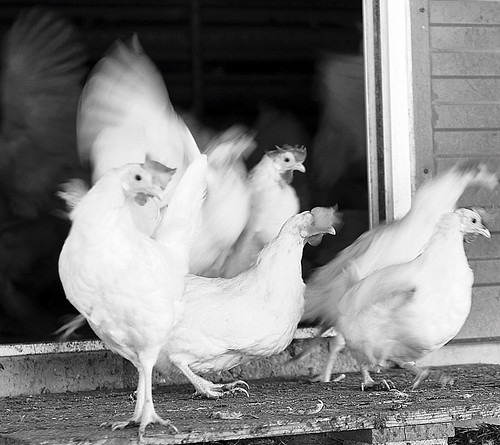From Soil To Table went to Sørli farm, located southeast of Sarpsborg in the commune of Skjeberg, in order to have a look at organic production of eggs. When we arrived at the farm, we were received by Runar Sørli and Hanne Fjeldbraaten.
We were invited to join them for lunch in a nice, ochre-coloured timber house, which looked it was built at least 100 years ago. How wrong we were! I built this house 4 years ago, Runar told us. Then, we entered a pleasant and roomy kitchen where Hanne was cooking lunch. She was cooking chicken stew, making the room filled with a lovely flavour of sauce and vegetables in addition to stimulating the taste buds.
Hot food for lunch was commonly served at the farm, we were told. I started at 5 in the morning and a decent meal is required around noon, Runar said, between mouthfuls of meat, sauce and vegetables. We were also offered cold, fresh and organic milk straight from one of his 200 cows. A splendid taste, but more or less completely unavailable for the rest of us not having our own cows. Norwegian farmers aren’t allowed to sell unpasteurised milk because it’s dangerous, while cigarettes and liquor are sold all across the country. Well satisfied, after having eaten a pie with strawberries and coffee, it was time to have a look at the chickens.
The poultry farm was located a short distance from the farmer’s house. Runar, the farmer, is raising 7500 chickens at a time together with a few roosters. The chickens are producing eggs from arrival at the farm at the age of 14-16 weeks until they are 75 weeks, that is, a little less than one and a half year. Then, all the chickens are finished off, the poultry farm is cleaned, and a new group of chickens is bought from a company called Bjørk Hansen at Askim in the county of Østfold. The young chickens are laying small and delicious eggs for 2-3 weeks before they start laying normally-sized eggs. Changing a group of chickens leads to a period of about 2 months with no production of eggs. The chickens are eating organic fodder, purchased from a company called Norgesfôr (Norway fodder), consisting of wheat, rye and maize. The fodder is supplemented with some cereals from the farmer’s own harvest.

